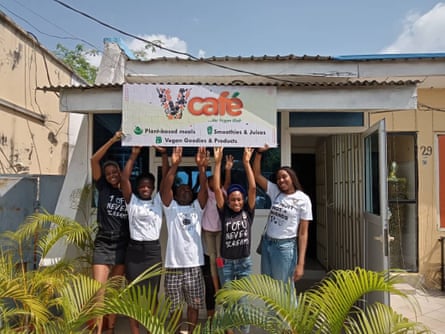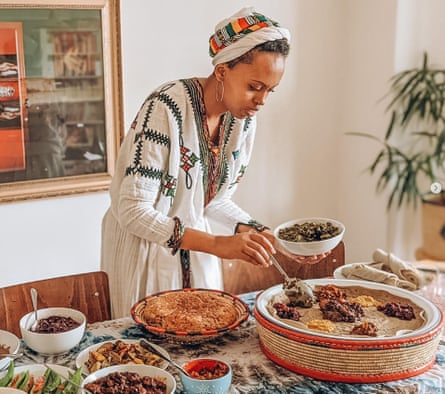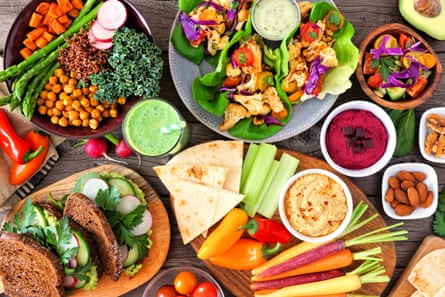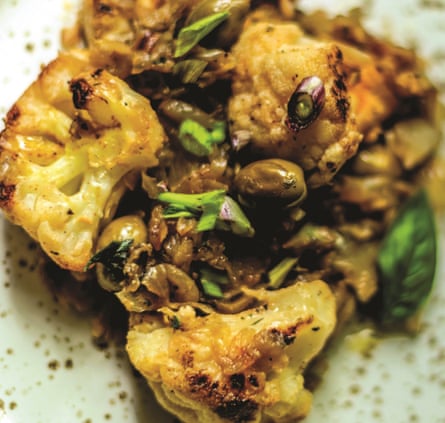From theguardian.com
When Nicola Kagoro returned to Zimbabwe after a five-year stint as executive chef at one of Cape Town’s premier vegan restaurants, her vision had been to take what she had learned about affordable plant-based food and bring it home to Harare.
“Our dinners were six-course vegan meals with an international vegan chef: me,” she says. However, she soon had a bruising realisation: back in 2016, when she was first setting up, local people simply had no interest in buying what she was selling.
“There was no vegan culture in Zimbabwe,” says Kagoro, founder of the cookery business African Vegan on a Budget, who goes by the professional name Chef Cola. “[People] didn’t understand how you could have a six-course meal without meat. We were literally charging just US$1 for people to come to the dinners.”
After a while, however, attracting people to Kagoro’s table became less of a struggle. Her reputation from Cape Town reached the Zimbabwean capital and veganism, or at least plant-based food, became almost trendy. “[The dinners] went from $1 to me charging close to US$60 [£50] to have a seat at the table,” she says.
Now Kagoro, 34, has fronted a cooking slot on Zimbabwean television, is launching a takeaway service in March, and has thousands of followers on social media to whom she extolls the virtues – ethical, health and economic – of ditching animal products. “I think there are more African vegans coming out of the closet now,” she says. “They just didn’t speak about it before.”
For the past 40 years or so, Africa’s middle class has been growing, albeit with huge geographic variations – and linked to that growth are changing lifestyles and consumption patterns. Fast-food giants arrived on the continent and tapped into a clientele with more disposable income than ever before.
One of the results, say vegan entrepreneurs, chefs and activists, is that in many places meat and dairy have gone from rare luxuries to everyday staples. And that, they say, is not good for anyone: not for the planet, for animals, for people’s health – or their wallets. Together, they are trying to fight back, and although the number of people identifying as vegan is still tiny, the 1.2 billion-strong continent could yet prove vital for the direction of the global vegan movement.
“Nigeria will be the third most populous country in the world in 25 years,” says Hakeem Jimo, 51, co-founder of Nigeria’s first vegan restaurant, Veggie Victory. “So all the veganism in the UK and the Netherlands … sorry, it’s great, but the numbers are going to be decided somewhere else.”

Veggie Victory’s Vcafe became Nigeria’s first vegan restaurant when it opened in 2013. Photograph: Veggie Victory
What gives people such as Jimo and Kagoro hope is that while the term “veganism” is still viewed by most Africans as a diaspora-driven western import, plant-based diets are deeply embedded in the continent’s traditional way of life.
Marie Kacouchia, the Franco-Ivorian author of the cookbook Vegan Africa, published in English last month, says that during her research she did not encounter anyone calling themselves a vegan in Ivory Coast “who was really from [there] and not an expat”. But she did meet a lot of people who stick steadfastly to a plant-based diet simply because that is what they have always known. “They will not label themselves vegan, because … it’s not something that is in their representation,” she says.
That does not mean they are any less vegan. Kacouchia recalls a woman in her family’s village who told her she could not even conceive of regularly eating meat or other animal products. “She did not grow up eating meat and her diet would be completely transformed if she had to include it,” she says.
Kacouchia’s book is replete with coconut milk and cacao, plantain and cassava, watermelon and mango, at least in part a capturing of her childhood memories: of her mother’s fragrant stews, of fried plantain on the beach after church. It is also, she says, an attempt to bust some myths about the traditional African diet, namely that it is inherently meat-heavy and unhealthy.
“It was about inspiring Africans and people of African heritage to look at their diet differently and to also understand their origins, away from this European-centric vision that we have that is narrated by colonialism,” she says. “We want to make African people proud again, and we want them to regain faith in themselves, and to reinvent a veganism that is not European-centric.”
One country with its own distinctive form of veganism is Ethiopia, where the Orthodox Christian community (with about 32 million members, according to a 2007 census) fasts for at least 180 days a year. When breaking their fast, or tsom in Amharic, the nation’s Orthodox Christians must not consume any animal produce and therefore eat a diet that is vegan by another name.
For Helen Mebrate, a UK-based Ethiopian vegan who shares mouthwatering recipes on Instagram as @Ethiopianfoodie, this rich food tradition provides all anyone could need, from shiro wot (roasted and ground chickpea stew) to alech (seasoned carrots, potatoes and beetroot).
 Helen Mebrate, a UK-based vegan chef from Ethiopia. Photograph: Courtesy of Helen Mebrate
Helen Mebrate, a UK-based vegan chef from Ethiopia. Photograph: Courtesy of Helen MebrateBut she fears it is increasingly at risk. “It’s a bit sad to see so many burger places, so many meat places [in cities such as Addis Ababa]. And nowadays when you Google Ethiopian food … one of the first images that you see is meat dishes and I’m like, ‘since when did this become a thing?’ It’s changing so much. But when I was growing up, it was very much like a rainbow plate, with loads of pulses and greens.”
It is to try to fight back against this rapidly changing landscape that people such as Nabaasa Innocent, founder of the Uganda Vegan Society, are mobilising. In January the Kampala-based activist coordinated the first ever Africa Vegan Restaurant Week, an effort to showcase dozens of venues across the continent that are either vegan or offer vegan dishes.
“Some of these local restaurants don’t even have an online presence. So we thought as Africa it’s high time we united … [to] promote the options, because they are readily available,” she says. A concern for animal welfare drives Innocent’s veganism but more persuasive arguments for most Ugandans, she admits, are health and cost.
“Plant-based foods are more affordable and more available,” she says. “For example, to buy a kilo of goat meat I need about 20,000 Ugandan shillings [£4.50]. But then to buy a kilo of beans I need 5,000 Ugandan shillings or even less. Now that’s the best quality of beans but even at 3,000 Ugandan shillings, which is basically less than $1, I can still find a kilo of nice beans.”
 In January, Africa vegan restaurant week showcased food in dozens of venues across the continent. Photograph: Africa Vegan Restaurant Week
In January, Africa vegan restaurant week showcased food in dozens of venues across the continent. Photograph: Africa Vegan Restaurant WeekBorn out of frustration with the lack of vegan options available to him when visiting family in Nigeria, Fashola’s vision was given extra impetus when his father died of cardiovascular disease in 2021. “It gave me the drive to push things forward,” he says, noting the health problems that a growing number of Africans face due in part to changing lifestyles and consumption habits, a connection that “a lot of people don’t appreciate”.
To begin with, Fashola says, his father had a typical reaction to his business idea: “If you speak to every African parent, they probably laugh at you when you say you’re vegan, and they offer you chicken or they offer you fish,” he says, laughing. “Initially, it was the same thing [with my dad]. It took a lot of education and I had to send him a lot of articles. And I think the more time he had to understand it, the more he came on board.”
Before he died, his father had come full circle, even nurturing a vision of a fully plant-based restaurant in a hotel he wanted to build. The change in his attitude, Fashola believes, could be mirrored across the continent. “He was coming along gradually. I think that’s the process within Nigeria, within Africa. I think it’s a slow burner. But with the right strategic influencers that can help us create the right noise … I feel like there’s a percentage of the market that would appreciate what we’re trying to do.”
There are some goals, however, that remain elusive, at least for now. Jimo, who spent years coming up with the right formula for his meat alternative – just chunky and chewy enough to suit the Nigerian palate – has now set his sights on something more complicated. “We’re still trying to fake a goat head,” he says, laughing. “That’s one of the delicacies here. The first plant-based goat head!”
Cauliflower yassa with olives
 Cauliflower yassa with olives
Cauliflower yassa with olivesPrep 15 min
Rest 1 hr
Cook 35 min
Serves 4
You may have already heard of yassa, a traditional Senegalese dish made with chicken or fish. Yassa is a staple of west African cuisines. This is my vegan version using cauliflower. Its dense texture makes it a lovely substitute for chicken. Serve with white rice.
Juice of 1 lemon
2 tbsp mustard
2 garlic cloves, minced
1 tsp freshly grated ginger
Salt
Black pepper
1 large cauliflower, chopped
6 medium onions, thinly sliced
½ cup (65g) green olives, pitted
3 tbsp olive oil
1 bunch parsley, chopped
1 tbsp coconut sugar
2 bay leaves
1 Mix the lemon juice, mustard, garlic, ginger, salt and pepper in a large bowl. Add the cauliflower, onions and olives, and toss to coat. Marinate for at least an hour (or overnight in the refrigerator).
2 Remove the cauliflower from the bowl and set aside.
3 Heat 2 tbsp of the oil in a non-stick saucepan over a medium heat. Add the onions and marinade mixture and cook until translucent, about 5 minutes. Add the parsley, sugar and bay leaves and mix well. Add 3 tbsp water, cover and simmer until the onions have softened, for 10 to 15 minutes.
4 Heat the remaining oil in a frying pan over a medium-high heat. Add the cauliflower and cook until tender and golden brown, 15 minutes.
5 Stir the cauliflower into the onion mixture. Adjust the seasoning to taste and enjoy while hot.
Recipe from Vegan Africa: Plant-Based Recipes from Ethiopia to Senegal by Marie Kacouchia © Éditions La Plage, 2021. Translation © The Experiment, 2022. Reprinted by permission of the publisher







